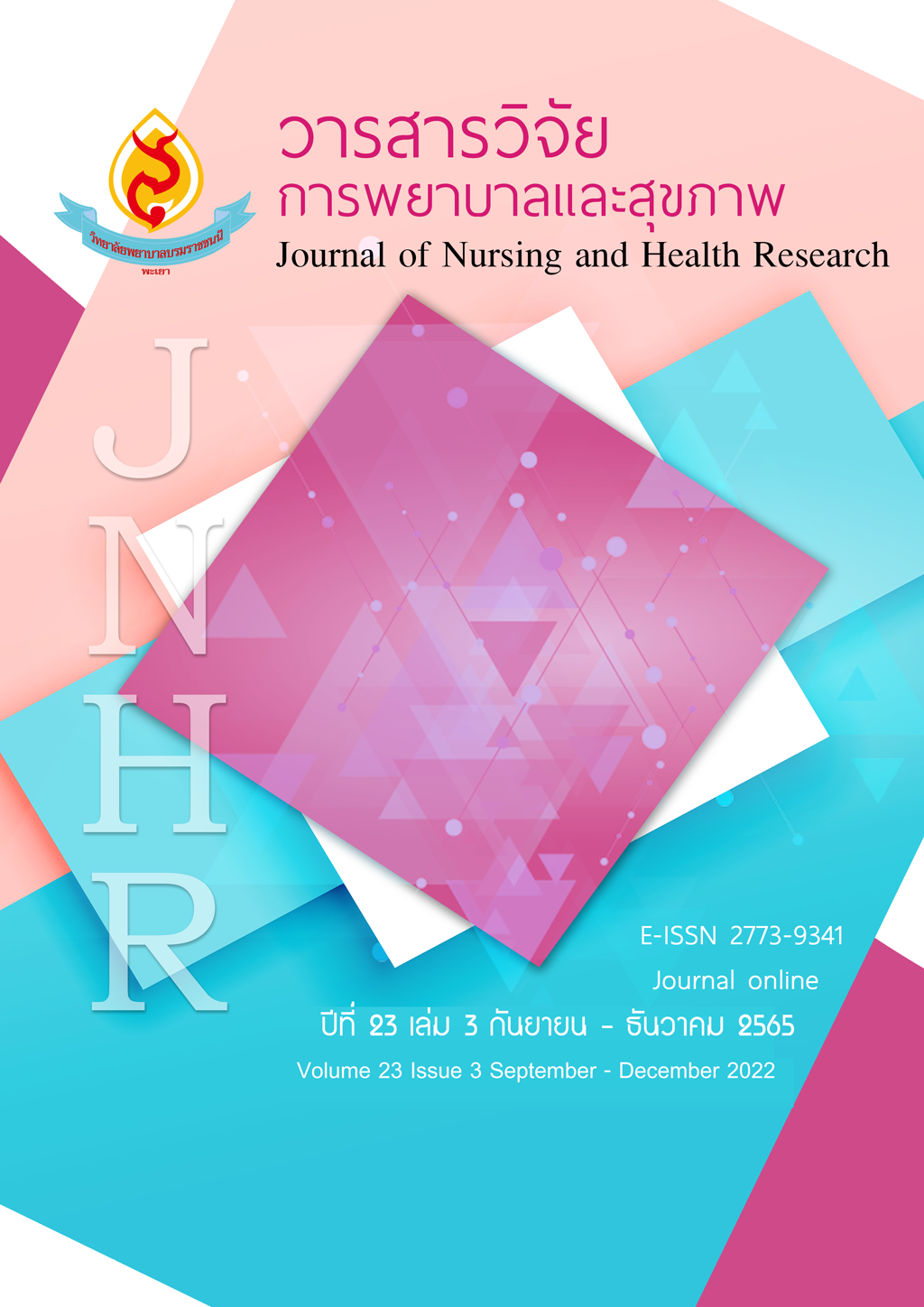การส่งเสริมสุขภาพจิตผู้สูงอายุในสถานการณ์ระบาดของโรค COVID-19
คำสำคัญ:
การส่งเสริมสุขภาพจิต, ผู้สูงอายุ, โรค COVID-19บทคัดย่อ
การแพร่ระบาดของโรค COVID-19 ส่งผลกระทบทุกภาคส่วนทั่วโลกทั้งระดับบุคคล ครอบครัว และชุมชนในระดับบุคคลส่งผลต่อทุกกลุ่มวัย โดยเฉพาะผู้สูงอายุที่เป็นกลุ่มเปราะบางและเป็นกลุ่มที่มีความเจ็บป่วยด้วยโรคประจำตัว ย่อมได้รับผลกระทบทั้งด้านร่างกาย จิตใจอารมณ์และสังคม มากกว่ากลุ่มอื่นๆ การส่งเสริมสุขภาพจิตผู้สูงอายุนับเป็นสิ่งจำเป็น เพื่อสนับสนุนและกระตุ้นให้ผู้สูงอายุตระหนักและใส่ใจต่อการดูแลสุขภาพของตนเองรวมทั้งเป็นความท้าทายของครอบครัว เครือข่ายภาคประชาชนและสังคมที่ต้องให้ความสำคัญและร่วมมือช่วยเหลือผู้สูงอายุ การส่งเสริมสุขภาพเป็นสิ่งที่ให้ผลคุ้มค่าระยาว เป็นการผนึกกำลังทั้งผู้สูงอายุและเครือข่าย บทความนี้มีวัตถุประสงค์เพื่อนำเสนอแนวทางปฏิบัติในการส่งเสริมสุขภาพจิตผู้สูงอายุในสถานการณ์ระบาดของโรค COVID -19 ประกอบด้วย การส่งเสริมสุขภาพจิตในระดับบุคคล ได้แก่ การส่งเสริมสุขภาพพื้นฐานที่จำเป็น การลดและหลีกเลี่ยงความเครียดที่เกิดจากสถานการณ์ การสร้างความสุข 5 มิติ และการยึดหลักศาสนา ระดับครอบครัว ได้แก่ การสังเกต การใส่ใจรับฟัง การสื่อสารชัดเจน การชวนทำกิจกรรม และการพาไปพบแพทย์ และระดับชุมชน ได้แก่ ชุมชนร่วมกันใส่ใจการใช้วัคซีนชุมชน การใช้เทคนิคทำให้ผู้สูงอายุมีความสุข และการจัดโปรแกรมดูแลสุขภาพโดยชุมชน เพื่อคงไว้ซึ่งสุขภาพกายและสุขภาพจิตที่ดี สร้างความรู้สึกที่มีคุณค่าต่อกัน ป้องกันปัญหาสุขภาพจิตในอนาคต ถึงเวลาแล้วที่ทุกฝ่ายควรหันมาใส่ใจต่อการส่งเสริมสุขภาพจิตผู้สูงอายุในสถานการณ์ปัจจุบัน เพื่อรองรับสังคมผู้สูงอายุอย่างมีคุณภาพและเพื่อความมั่นคงของประเทศชาติ
เอกสารอ้างอิง
กรมสุขภาพจิต. (2564). ความเสี่ยง และผลกระทบต่อผู้สูงอายุในช่วง Covid-19. สืบค้นเมื่อ 2 พฤศจิกายน 2564, จาก https://www.dmh.go.th/news-dmh/view.
กรมสุขภาพจิต. (2563). แนวทางการสร้างวัคซีนใจในชุมชนภายใต้สถานการณ์การแพร่ระบาดของ COVID-19. กรุงเทพมหานคร: บริษัท บียอนด์ พับลิสชิ่ง จํากัด.
กองทุนประชากรแห่งสหประชาชาติ ประเทศไทย. (2563). บทสรุปผู้บริหารผลกระทบโควิด-19 ต่อผู้สูงอายุ. สืบค้นเมื่อ 23 ตุลาคม 2564, จาก www.thailand.unfpa.org/th/covid.
กองส่งเสริมและพัฒนาสุขภาพจิต. (2563). แนวทางการดูแลสังคมจิตใจผู้สูงอายุในสถานการณ์โควิด-19 สำหรับผู้ดูแลผู้สูงอายุ/อาสาสมัครสาธารณสุข (อสม). กรุงเทพมหานคร: พรอสเพอรัส พลัส
แจ่มจันทร์ เทศสิงห์ และพัชรี แวงวรรณ. (2564). บทบาทของพยาบาลในการส่งเสริมสุขภาพผู้สูงอายุให้ห่างไกลจากโรคติดเชื้อไวรัสโคโรนา 2019. วารสารวิจัยและพัฒนาด้านสุขภาพ สํานักงานสาธารณสุขจังหวัดนครราชสีมา, 7(2), 19-36.
ทศา ชัยวรรณวรรต. (2560). บทบาทของพยาบาลจิตเวชในการส่งเสริมสุขภาพจิตและการป้องกันการเจ็บป่วยทางจิต. วารสารการพยาบาลจิตเวชและสุขภาพจิต, 31(2), 16-29.
ธัญยรัชต์ องค์มีเกียรติ. (2561). ภาวะเปราะบางในผู้สูงอายุ: กรณีศึกษา. วารสารสภาการพยาบาล, 33(3) 5-9.
ปาริชาติ แว่นไวศาสตร์. (2563). บทบาทของพยาบาลจิตเวชในการส่งเสริมสุขภาพจิตผู้สูงอายุโดยยึดหลักพุทธจริยศาสตร์. วารสารวชิรสารการพยาบาล, 22(2), 105-117.
มูลนิธิสถาบันวิจัยและพัฒนาผู้สูงอายุ. (2564). สุขภาพกายจิตย่ำแย่วิกฤตที่ผู้สูงอายุต้องเผชิญในยุคโควิด 19. สืบค้นเมื่อ 23 ตุลาคม 2564, จาก https://www.thaitgri.org.
ยศ วัชระคุปต์และสมชัย จิตสุชน. (2564). ผลกระทบของโควิด 19 ต่อผู้สูงอายุ. สืบค้นเมื่อ 23 ตุลาคม 2564, จาก www.tdri.or.th/2020/09/the-impact-of-covid-19-on-older-persons.
วนิดา ศรีวรกุล, รัชนีภรณ์ ทรัพย์กรานนท์, พรชัย จูลเมตต์, และอำนวย ยุ่นประยงค์. (2557). ประสบการณ์การปฏิบัติตนด้านการส่งเสริมสุขภาพของผู้สูงอายุคาทอลิก. วารสารพยาบาลศาสตร์, 41(ฉบับพิเศษเดือนพฤศจิกายน), 169-179.
วรวุฒิ ชมภูพานและคณะ. (2564). ผลของการดูแลสุขภาพผู้สูงอายุที่มีความวิตกกังวลแบบวิถีชีวิตใหม่ใน สถานการณ์การระบาดของโควิด-19. วารสารวิจัยทางวิทยาศาสตร์สุขภาพ, 15(1), 81-92.
ศุทรา เอื้ออภิสิทธิ์วงศ์, ดุษฎี จึงศิรกุลวิทย์ และพันธุ์นภา กิตติรัตนไพบูลย์ (ผู้แปล). (2560). การส่งเสริมสุขภาพจิต แนวคิด หลักฐาน และแนวทางปฏิบัติ. เชียงใหม่: ห้างหุ้นส่วนจำกัดวนิดาการพิมพ์.
สมาคมจันทร์เสี้ยวและสาธารณสุข. (2552). การบูรณาการองค์ความรู้บทบัญญัติศาสนาอิสลามกับการเสริมสร้างสุขภาพ: สุขภาพจิต. สถาบันวิจัยระบบสุขภาพภาคใต้ มหาวิทยาลัยสงขลานครินทร์.
สำนักงานสถิติแห่งชาติ. (2564). สำรวจประชากรสูงอายุในประเทศไทย พ.ศ. 2564: บทสรุปผู้บริหาร. สืบค้นเมื่อ 28 กันยายน 2565, จาก https://www.nso.go.th.
สำนักส่งเสริมและพัฒนาสุขภาพจิต กรมสุขภาพจิต. (2558). คู่มือความสุข 5 มิติสำหรับผู้สูงอายุ (ฉบับปรับปรุง). นนทบุรี: โรงพิมพ์ชุมนุมสหกรณ์การเกษตรแห่งประเทศไทย จำกัด.
สุดา วงศ์สวัสดิ์. (บ.ก.). (2563). องค์ความรู้การดูแลสุขภาพใจในสถานการณ์การระบาด โควิด-19 “ใจพร้อม ไม่ยอมป่วย”. นนทบุรี: กรมสุขภาพจิต กระทรวงสาธารณสุข.
สุนิสา ค้าขึ้นสุนิสา ค้าขึ้น, หฤทัย กงมหา, วิจิตร แผ่นทอง, และปรางทิพย์ ทาเสนาะ เอลเทอร์. (2563). ภาวะสุขภาพจิตและปัจจัยที่เกี่ยวข้องในผู้สูงอายุ. วารสารวิจัยสุขภาพและการพยาบาล, 36(3), 151-163.
Administration for Community Living. (2020). National older adult mental health awareness : combating social isolation for seniors during the COVID -19 pandemic. Retrived June, 28, 2021, from https://acl.gov/news-and- events/announcements/. American Foundation for Suicide Prevention. (2020). COVID-19: We must care for older adults &mental health. Retrived June, 26, 2021, from https://www.afsp.org/story/covid-19-
Berg-Weger, M. & Morley, J. E. (2020). Loneliness and social isolation in older adults during the COVID-19 pandemic: implications for gerontological social work. Journal of Nutrition Health and Aging, 24(5), 456-458.
Gardiner, C., Geldenhuys, G., & Gott, M. (2018). Interventions to reduce social isolation and loneliness among older people: an integrative review. Health & social care in the community, 26(2), 147-57.
Girdhar, R., Srivastava, V., Sethi. S. (2020). Managing mental health issues among elderly during COVID-19 pandemic. Journal of Geriatric Care and Research, 7(1), 29-32.
Nabarro, D. (2020). Leaders speak out about their concerns regarding older people in the context of COVID-19. Retrived November, 16, 2021, from https://www.who.int/news-room/feature-stories/detail/leaders-speak-out-older-people-covid-19)
Özdil, K., Bulucu Büyüksoy, G. D., & Çatıker, A. (2021). Fatalism, fear, and compliance with preventive measures in COVID-19 pandemic: a structural equation modeling analysis. Public health nursing (Boston, Mass.), 38(5), 770–780. https://doi.org/10.1111/phn.12898
Sgarbieri, V. C. & Pacheco, M. T. B. (2017). Healthy human aging: intrinsic and environmental factors. Brazilian Journal of Food Technology, 20(2), 1-23.
The University of Georgia. (2021). What is health promotion?. Retrived February, 11, 2022, from https://www.publichealth.uga.edu/departments/health-promotion-behavior.
Troutman-Jordan, M., & Kazemi, D. M. (2020). COVID-19's impact on the mental health of older adults: Increase in isolation, depression, and suicide risk. an urgent call for action. Public health nursing, 37(5), 637–638. https://doi.org/10.1111/phn.12774
Worldometer. (2022). COVID-19 Coronavirus pandemic cases. Retrived November, 23, 2022, from https://www.worldometers.info/coronavirus.
World Health Organization. (2020). Mental health and psychosocial considerations during the COVID-19outbreak. Retrived February, 28, 2022, from www.who.int/docs/default-source/coronavirus/mental-health-considerations.
World Health Organization. (2022). Aging. Retrived November, 15, 2022, from https://www.who.int/health-topics/ageing.
ดาวน์โหลด
เผยแพร่แล้ว
รูปแบบการอ้างอิง
ฉบับ
ประเภทบทความ
สัญญาอนุญาต
ลิขสิทธิ์ (c) 2022 วารสารวิจัยการพยาบาลและสุขภาพ

อนุญาตภายใต้เงื่อนไข Creative Commons Attribution-NonCommercial-NoDerivatives 4.0 International License.



